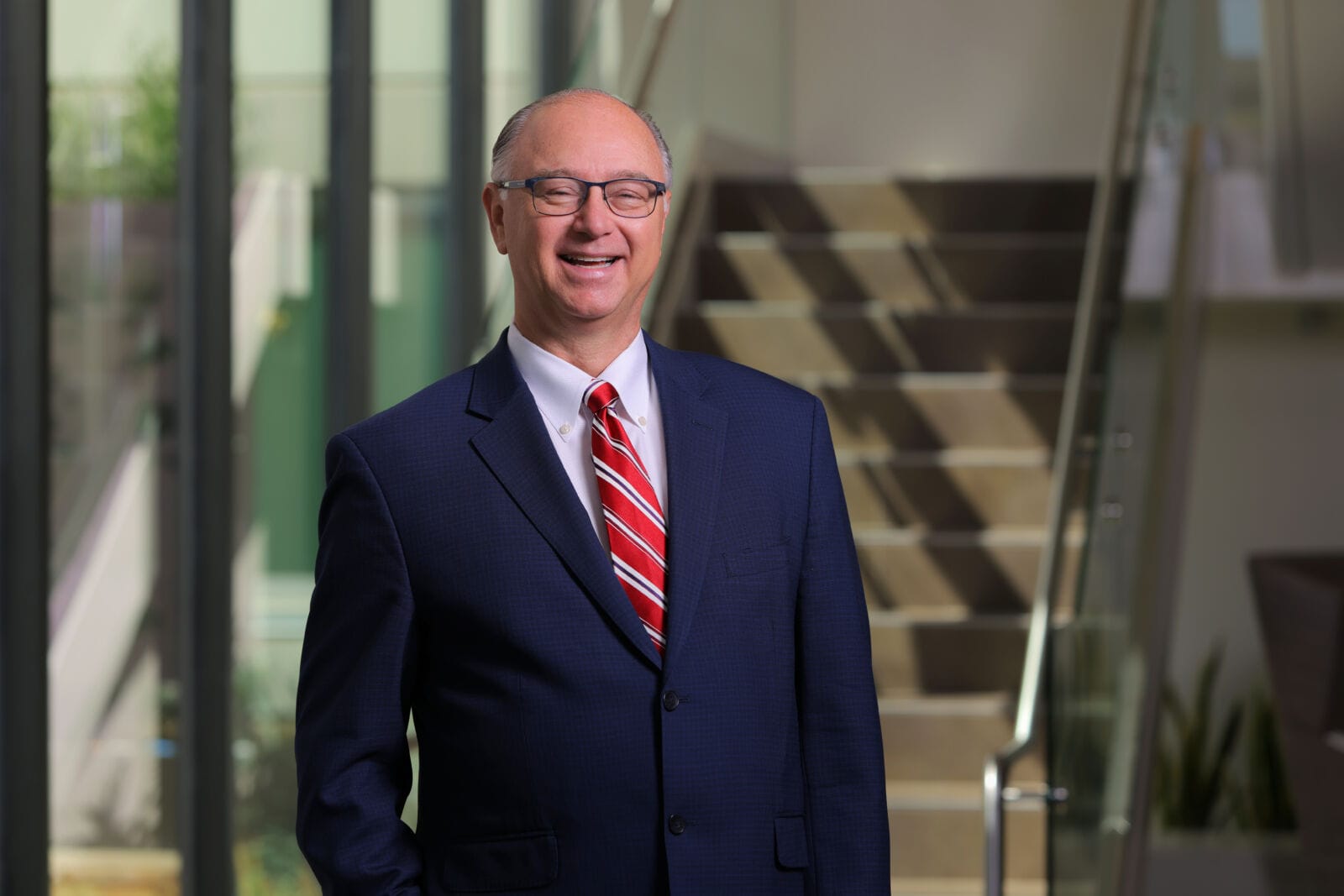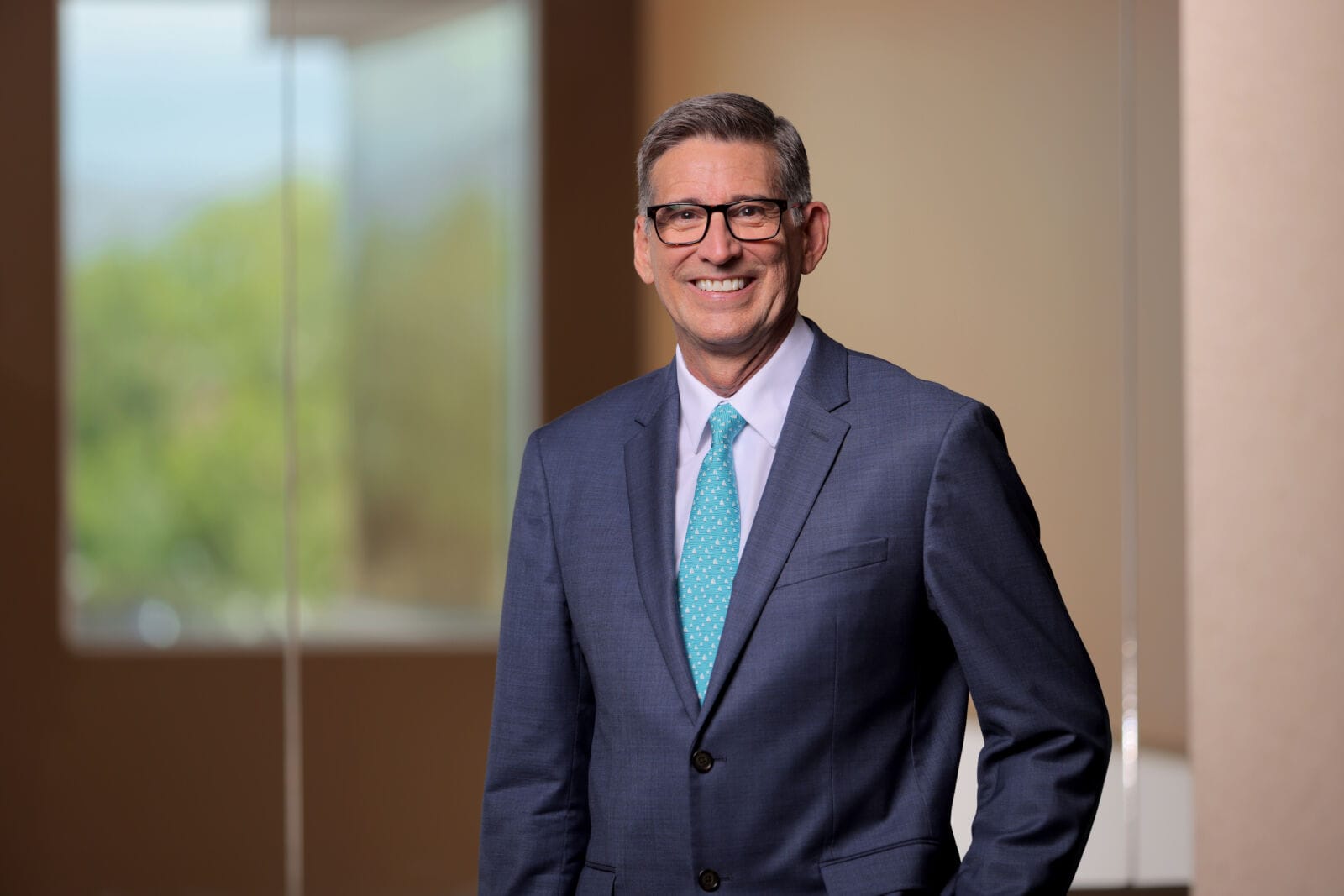When Todd LaPorte became the 10th CEO in the 150-year history of the Arizona-based healthcare organization now known as HonorHealth, he didn’t make any of the typical power moves to signal there was a new sheriff in town.
There was no corner office makeover — not even a new paint job.
“I had a mural put on the office wall,” LaPorte says. “It shows people performing their roles with smiles on their faces, showing that they enjoy what they do.”
The mural in LaPorte’s office includes the HonorHealth logo and the phrase, “The joy of making a difference.”
LOCAL NEWS: The 100 best doctors in Arizona for 2025
INDUSTRY INSIGHTS: Want more news like this? Get our free newsletter here
The brilliance of LaPorte’s gesture is that those six simple words — the joy of making a difference — capture the essence and mission of HonorHealth: to improve the health and well-being of those it serves. The organization is guided by its ICARE values: Innovation, Collaboration, Accountability, Respect and Empathy. Through these efforts, HonorHealth has become a pivotal player in enhancing healthcare accessibility and the quality of care across Arizona.
“There are different taglines we’ve used, but they’re not just for marketing purposes,” LaPorte says. “One we use now captures part of our culture, which is ‘go beyond.’ The idea is that it’s OK to care and extend yourself beyond the minimum requirements. We love people who demonstrate enthusiasm and engagement and have an attitude of, ‘Yes, I’m going to go beyond.’”
HonorHealth has been going beyond expectations for more than a decade, evolving into a healthcare innovator and game-changer — pioneering advanced treatments, catalyzing cutting-edge research, redefining patient care and setting new standards for medical excellence. All of this has been accomplished while fostering a culture that provides the most approachable and accessible medical experts in the industry — a rarity in today’s healthcare landscape.

A history of helping
HonorHealth’s roots date back to 1927, when Desert Mission was established in Sunnyslope to aid tuberculosis patients and underserved populations. Desert Mission eventually evolved into the John C. Lincoln Health Network. In 1962, City Hospital of Scottsdale opened, later becoming Scottsdale Osborn Medical Center and eventually evolving into Scottsdale Healthcare.
HonorHealth was born when the John C. Lincoln Health Network and Scottsdale Healthcare officially merged in 2015.
And what a decade it has been.
“In the last decade, we stabilized the merger of two organizations, we effectively responded to a public healthcare crisis during the pandemic, we raised our quality ratings from third-party objective sources, and we improved our employee and physician engagement compared to our peer group,” LaPorte says. “We expanded our footprint and created more convenience and access to care through medical group practices and urgent care sites. We developed a rehab hospital, a behavioral health hospital and we advanced clinical programs with world-class talent in cardiology, neurosciences and orthopedics.”
Through all those successes, HonorHealth has remained true to the original mission of Desert Mission — serving community members with the greatest need. A powerful example of that commitment is HonorHealth’s acquisition of several Arizona-based Steward Health Care facilities.
“There was a part of the community that was going to have their healthcare service availability put at risk,” LaPorte says. “We felt the calling and saw it as something we could help address. I’m very proud of all the people in our organization who helped make that happen.”
Culture club
Not only did the Steward acquisition reflect the mission of HonorHealth, it also illustrates another key differentiator for the organization: its culture.
“Culture is such an obtuse word in so many ways,” says Kim Post, executive vice president and chief operations officer for HonorHealth and one of Az Business magazine’s Most Influential Women in Arizona Business for 2018. “But it became clear to me, after acquiring these new hospitals in the East Valley, just how wonderful a culture we have — and how that culture breeds success and commitment to our mission.”
Post, whose background is in nursing, says HonorHealth’s culture is centered around its overarching mission: providing exceptional care for patients wherever they are, empowering staff to grow professionally and leading with honor. The glue holding all these aspirations together, she says, is effective communication.
“That culture enables us to focus on safety,” Post says.
HonorHealth not only offers safety-related classes and events for the public and patients, but it also held a mass casualty incident exercise, allowing medical centers and agencies to review and evaluate policies, procedures and responses to decontamination scenarios.
“We are happy when we find problems with systems,” Post says. “Because we want to keep them from happening again. The culture we often see in healthcare is the exact opposite — they don’t want anything bad to be talked about. But you cannot fix anything that way. Our culture is very focused on providing the safest, best outcome for patients that we possibly can, no matter where they appear.”
That philosophy ties back to HonorHealth’s commitment to “going beyond.”
“We have built a culture where people say, ‘I’m not told I have to do it; I’m not asked to do it — but you know what? I want to do it,’” LaPorte says. “There’s also this idea of working together and being a team, which was really pronounced during the pandemic. There’s no way to get through a crisis without people respecting their lanes — but also respecting the synergy of working together. And that’s a vital part of the culture at HonorHealth.”

Culture of innovation
Another way HonorHealth goes beyond is by being an innovator and trailblazer in the healthcare space. Fueling much of that innovation is the HonorHealth Research Institute (HRI), which is focused on advanced treatments and personalized medicine. A powerful example of the game-changing work being done at HonorHealth is the development of a simple blood test that can help predict who is at higher risk for developing Alzheimer’s disease — years before any symptoms like memory loss or confusion begin.
“Our mission has been to make sure people in our community have access to cutting-edge technology and next-generation therapies and devices,” says Dr. Mark Slater, vice president for research at HonorHealth and CEO of HRI.
Local access to such advanced treatments was rare when HRI was launched 20 years ago. That has changed dramatically. The research being done — and the results being achieved — at HRI have helped make Metro Phoenix a destination for those seeking solutions to complex healthcare challenges.
“Just within our institute, we have patients from all 50 states and about 37 countries who come here for our early-stage clinical trials and research because they have a problem that’s not well served by standard medicine,” Dr. Slater says. “They don’t know what to do, and they’re seeking out expertise.”
Dr. Slater attributes HRI’s success to its ability to unite the best researchers from academia with brilliant clinical minds. Together, they are making life-changing differences right here in Arizona.
“In the academic world, we were always frustrated because the bureaucracy was slow, expensive and it was difficult to access patients. It took about 30 years for new advances to move from academic research into standard care,” Dr. Slater says. “Here, we’ve learned to shorten that timespan, eliminate the middleman, reduce bureaucracy, make it nimble and quick, and focus on situations where both patients and doctors have pressing needs — and we can apply advanced science to make a difference.”
That’s where HonorHealth has set itself apart as a healthcare leader.
“HonorHealth has attracted world-class talent and cutting-edge technology, yet packaged it all in a warm, welcoming environment that prioritizes caring for patients, their families, and the broader community,” Dr. Slater says. “That’s been unique in my years of medicine.”
Is there a doctor in the house?
Another unique aspect of HonorHealth is how it interacts with its medical staff. While physicians and nurses are on the front lines of patient care, they don’t always have a seat at the table when it comes to directing healthcare organizations. That’s not the case at HonorHealth, which has cultivated a culture that attracts and empowers some of the greatest minds in medicine.
“We have several physicians who sit on our senior executive leadership team,” says Dr. John Neil, executive vice president, chief physician executive, and network strategy officer for HonorHealth. “So there’s a lot of physician perspective at the highest levels of leadership in our organization — and the same is true for nursing. Some organizations view physicians as potentially disruptive. They don’t want doctors telling them what to do, so they don’t want them in the room. HonorHealth is the exact opposite. We want doctors there with us. We want doctors as part of the decision-making process because we feel like we’re all in this together. At the end of the day, we don’t have a business unless we have physicians who are eager and willing to treat patients in our facilities. And we recognize that.”
There is data showing a direct correlation between how engaged physicians and nurses are and their healthcare organization’s quality and patient safety scores.
“The clinical outcomes are better when physicians and other clinical staff are engaged and aligned with what you’re doing,” Dr. Neil says. “We don’t just view it as a business imperative. We view it as an ethical imperative to create an environment where people want to work — because we know it’s going to drive better outcomes for our patients.”
The future
Many healthcare organizations are finding themselves on life support as the nation grapples with a severe physician shortage, a crisis expected to worsen in the coming years. To help address that shortage, HonorHealth has become the primary clinical affiliate for the new ASU School of Medicine and Advanced Medical Engineering.
“We think being affiliated with a big, research-driven university that’s known for innovation is going to attract the next generation of talent — talent that isn’t afraid of emerging technologies and will actually become the creators of those technologies,” Dr. Neil says. “One of the reasons we launched the affiliation with ASU was to attract and retain talent that will hopefully stay in our community. We’re trying to address the physician shortage on multiple fronts — by helping to train and foster relationships with the next generation of healthcare workers, building a local health system that is a great place to work, and encouraging an environment of innovation and care. Organizations that don’t check all three of those boxes are going to face real challenges. We check all three.”
While it may sound counterintuitive for an organization focused on quality outcomes, delivering the best patient experienc, and expanding community access, LaPorte says one of HonorHealth’s goals is to see fewer patients in the future — by focusing on population health management.
“We’re very interested in being more than a hospital system — more than just treating people when they’re ill,” LaPorte says. “How do we engage with the community on the front end and help them be healthy and not need to go to the hospital? We view that as a victory. This is not about heads in beds. This is about keeping a community healthy.”




